What value can the University of Tokyo deliver to today’s global society based on the knowledge system it has established in Japan?
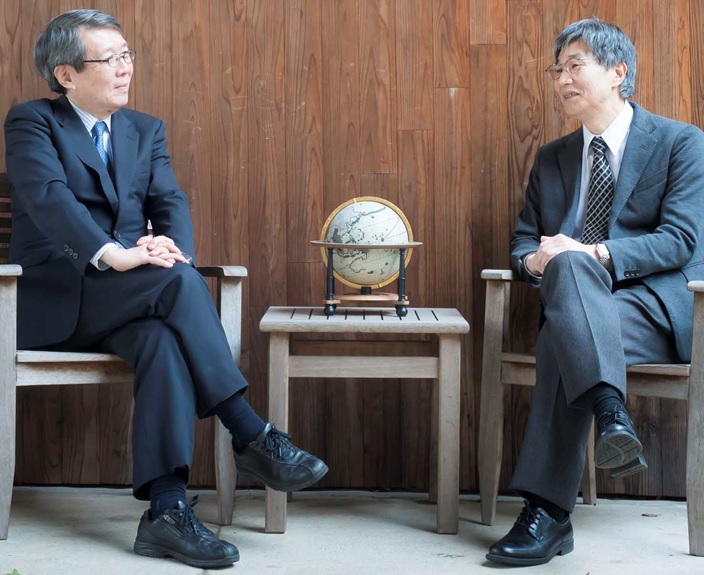
An opening conversation between experts on a special topic is a familiar feature of this magazine. For this issue, Professor Haneda, who is the executive at the University of Tokyo in charge of international affairs, spoke with Professor Takehiko Kariya of the University of Oxford. When asked with whom he would like to meet to talk about this topic, Professor Haneda had Professor Kariya at the top of his list.
With a terrestrial globe placed between them, the two professors talked about the roles to be played by universities in the international arena, the University of Tokyo’s position in the world, the way of internationalization desirable for the University, and expectations toward the University and its students.
――What roles should universities perform in an international society that is facing numerous challenges? What position should Japan, and the University of Tokyo in particular, take in the world? Could you start today by answering these questions?
Haneda: Let me speak first. I think global issues cannot easily be solved. There is no single, unique answer to each problem. Rather, there are various solutions to these problems, and universities function as places that provide individuals with sufficient knowledge to approach such solutions. As the progress of globalization has made it difficult for countries to maintain global order on their own, universities exist to create knowledge that contributes to the solution of global issues and to serve the global public. This philosophy, which is also referred to in the University of Tokyo Charter, is of critical importance. Japan has a knowledge system based on the Japanese language, which provides a source for unique ideas and distinctive approaches to problems. The University of Tokyo, as a Japanese university, should make use of this system to contribute to increasing the world’s store of knowledge. What are your thoughts on this, Professor Kariya?
With a terrestrial globe placed between them, the two professors talked about the roles to be played by universities in the international arena, the University of Tokyo’s position in the world, the way of internationalization desirable for the University, and expectations toward the University and its students.
――What roles should universities perform in an international society that is facing numerous challenges? What position should Japan, and the University of Tokyo in particular, take in the world? Could you start today by answering these questions?
Haneda: Let me speak first. I think global issues cannot easily be solved. There is no single, unique answer to each problem. Rather, there are various solutions to these problems, and universities function as places that provide individuals with sufficient knowledge to approach such solutions. As the progress of globalization has made it difficult for countries to maintain global order on their own, universities exist to create knowledge that contributes to the solution of global issues and to serve the global public. This philosophy, which is also referred to in the University of Tokyo Charter, is of critical importance. Japan has a knowledge system based on the Japanese language, which provides a source for unique ideas and distinctive approaches to problems. The University of Tokyo, as a Japanese university, should make use of this system to contribute to increasing the world’s store of knowledge. What are your thoughts on this, Professor Kariya?
Differences between universal fields and local fields
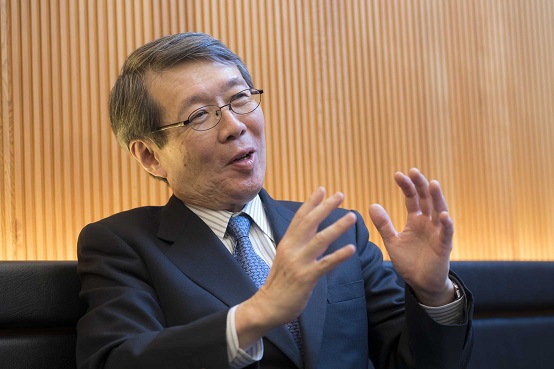
Executive Vice President, The University of Tokyo
Kariya: For convenience, let me roughly divide academic fields into the sciences and the humanities including social sciences. In the sciences, you usually write your papers in English and also use “universal languages” such as numerical and chemical formulas. Moreover, you study universal subjects. Therefore, you can conduct research in your field wherever you go in the world. In contrast, in the humanities and social sciences, what you study is closely related to the local history, society, and culture. Japan is indeed at the top globally in terms of the accumulation of academic knowledge regarding society and culture in a local language outside of the Western world. Japan has established a knowledge system based on the Japanese language, and has preserved its unique history and culture also in the form of academic studies. This is one of Japan’s strengths. For the past 20 to 30 years, people have slowly started to question Western-oriented ideas and have begun to consider the notion that the West may not be the center of the world. Against this backdrop, Japan could be a “nexus” for new ideas, within which the University of Tokyo would of course play a critical role.
Haneda: Yes, indeed. Japan has a knowledge system that allows us to think about and understand everything down to the minutiae of the world in Japanese. Furthermore, this knowledge system has readily incorporated knowledge gained in other languages, such as English and French, to become a complex and advanced system. Unfortunately, however, there are not so many foreigners who are interested in the system, and there have been few initiatives to translate the knowledge gained under this system into other languages. This is a problem.
Kariya: So far as it continues to be difficult to develop an automatic language translation system at a highly advanced level, having a local language that allows you to come up with precise expressions gives you an advantage. In fact it is often said that findings made in Japanese in humanities disciplines should be introduced outside the country beyond the framework of the local language. However, it must be noted that you need to understand what constitutes the meaningful sharing of information if you want your paper to be read by lots of people. A document translated from Japanese into another language will not attract attention unless it contains sufficient value. For example, if the information contained in a research paper is indispensable for the establishment of a certain theory, provides new ideas to researchers engaged in the relevant field, or offers readers some unique value, it will be deemed valuable also outside Japan. It’s necessary to take such factors into consideration when you are seeking an international audience for your paper.
Even within the humanities and social sciences, some studies in areas such as economics, psychology, sociology, and other subjects that are closely related to science can be conducted in any language. You can apply world-standard methods (often statistics and mathematical models) to your research conducted in Japanese; in other words, you can use a universal method to conduct research using data gained in the Japanese language. Nevertheless, doing so will not help highlight the excellence of the Japanese knowledge system. Even if there is something that differentiates your method from the standard, it will not provide enough value to attract the attention of people from other countries to your research. It would be better to attract their attention with knowledge rooted in Japanese history, culture, and ideas. However, if you overdo this, you might end up just insisting on how special or unique Japan is, such as in Nihonjin-ron (Japaneseness) research. Your research findings might cause a splash at first, but they will soon be forgotten.
Haneda: For example, Inazo Nitobe had a great impact on English-speaking people by writing about Japanese bushido in English. In his writing, he criticized the idea that the West was uniquely special, stating that Japan, which was not a Western country, had an equivalent to Western chivalry. However, I think he did not get so far as to change the global framework, which was based on the idea of “the West and the non-West.”
Kariya: So a Japanese scholar who was good at English introduced the spirit of the Japanese people based on his knowledge about the West. This is indeed a stage that you pass through in making cultural exchanges with other countries, but now we need to think about what roles Japan could fulfill in global society, and what he did is not sufficient to meet this requirement.
Haneda: He pointed out the bias of the Western-oriented way of thinking, but did not propose any better, alternative way of thinking. What we should do now is propose a new framework to understand what is happening in the world based on deep knowledge about the West.
Kariya: In the time of Nitobe, scholarly works written in English were intended to be read by people from the English-speaking world, but today, academic works in English tend to be read by people other than native English speakers. We need to think about how we can make Japanese ideas persuasive in the modern age.
Haneda: Returning to the roles of universities, it is important to also teach students the Japanese knowledge system in English and help them understand it in English, while giving them an appropriate education in Japanese. If the University of Tokyo can do this, it will have an advantage that other universities do not have.
Kariya: In fact, I am trying to do this in my classes at the University of Oxford. I can read and understand Japanese, which gives me an overwhelming advantage. When teaching about Japan through literature written in English, you can find gaps between what is written in English and what actually happened in Japan, or what is written in the corresponding Japanese literature, and it becomes an important theme to investigate these gaps and what they imply. This kind of research will lead to the finding of something new based on Japanese ideas. Japanese universities are working to increase the number of classes taught in English, but they cannot simply replace Japanese teachers with teachers from overseas. Even for native Japanese speakers to teach their subjects about Japan in Japanese, they must have a sense to see what they teach in Japanese as something that could be viewed from a different culture, like what non-Japanese natives teach about Japan in English from different cultural viewpoints.
Haneda: Yes, indeed, but many people cannot understand this point. I feel reassured by listening to your opinion.
Haneda: Yes, indeed. Japan has a knowledge system that allows us to think about and understand everything down to the minutiae of the world in Japanese. Furthermore, this knowledge system has readily incorporated knowledge gained in other languages, such as English and French, to become a complex and advanced system. Unfortunately, however, there are not so many foreigners who are interested in the system, and there have been few initiatives to translate the knowledge gained under this system into other languages. This is a problem.
Kariya: So far as it continues to be difficult to develop an automatic language translation system at a highly advanced level, having a local language that allows you to come up with precise expressions gives you an advantage. In fact it is often said that findings made in Japanese in humanities disciplines should be introduced outside the country beyond the framework of the local language. However, it must be noted that you need to understand what constitutes the meaningful sharing of information if you want your paper to be read by lots of people. A document translated from Japanese into another language will not attract attention unless it contains sufficient value. For example, if the information contained in a research paper is indispensable for the establishment of a certain theory, provides new ideas to researchers engaged in the relevant field, or offers readers some unique value, it will be deemed valuable also outside Japan. It’s necessary to take such factors into consideration when you are seeking an international audience for your paper.
Even within the humanities and social sciences, some studies in areas such as economics, psychology, sociology, and other subjects that are closely related to science can be conducted in any language. You can apply world-standard methods (often statistics and mathematical models) to your research conducted in Japanese; in other words, you can use a universal method to conduct research using data gained in the Japanese language. Nevertheless, doing so will not help highlight the excellence of the Japanese knowledge system. Even if there is something that differentiates your method from the standard, it will not provide enough value to attract the attention of people from other countries to your research. It would be better to attract their attention with knowledge rooted in Japanese history, culture, and ideas. However, if you overdo this, you might end up just insisting on how special or unique Japan is, such as in Nihonjin-ron (Japaneseness) research. Your research findings might cause a splash at first, but they will soon be forgotten.
Haneda: For example, Inazo Nitobe had a great impact on English-speaking people by writing about Japanese bushido in English. In his writing, he criticized the idea that the West was uniquely special, stating that Japan, which was not a Western country, had an equivalent to Western chivalry. However, I think he did not get so far as to change the global framework, which was based on the idea of “the West and the non-West.”
Kariya: So a Japanese scholar who was good at English introduced the spirit of the Japanese people based on his knowledge about the West. This is indeed a stage that you pass through in making cultural exchanges with other countries, but now we need to think about what roles Japan could fulfill in global society, and what he did is not sufficient to meet this requirement.
Haneda: He pointed out the bias of the Western-oriented way of thinking, but did not propose any better, alternative way of thinking. What we should do now is propose a new framework to understand what is happening in the world based on deep knowledge about the West.
Kariya: In the time of Nitobe, scholarly works written in English were intended to be read by people from the English-speaking world, but today, academic works in English tend to be read by people other than native English speakers. We need to think about how we can make Japanese ideas persuasive in the modern age.
Haneda: Returning to the roles of universities, it is important to also teach students the Japanese knowledge system in English and help them understand it in English, while giving them an appropriate education in Japanese. If the University of Tokyo can do this, it will have an advantage that other universities do not have.
Kariya: In fact, I am trying to do this in my classes at the University of Oxford. I can read and understand Japanese, which gives me an overwhelming advantage. When teaching about Japan through literature written in English, you can find gaps between what is written in English and what actually happened in Japan, or what is written in the corresponding Japanese literature, and it becomes an important theme to investigate these gaps and what they imply. This kind of research will lead to the finding of something new based on Japanese ideas. Japanese universities are working to increase the number of classes taught in English, but they cannot simply replace Japanese teachers with teachers from overseas. Even for native Japanese speakers to teach their subjects about Japan in Japanese, they must have a sense to see what they teach in Japanese as something that could be viewed from a different culture, like what non-Japanese natives teach about Japan in English from different cultural viewpoints.
Haneda: Yes, indeed, but many people cannot understand this point. I feel reassured by listening to your opinion.
You can take time to conduct careful research on a given theme if it has not yet been recognized as a research subject
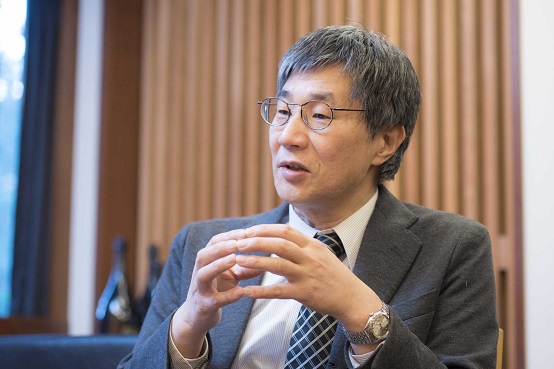
Professor, University of Oxford
Kariya: People who are researching Japan in English outside the country have themes that have not been recognized as research subjects by those researching Japan inside the country, and vice versa. If you talk about Japan by using data in line with international standards, you will have to obtain better data and adopt more advanced statistical methods in a speedier manner to beat others researching the same thing. However, if you come across a research subject which has gone unnoticed by everyone else, you will be able to take the time to conduct careful research on this theme. Finding such subjects would certainly help Japanese researchers to compete with native English-speaking researchers on a more equal footing.
――What do you think are the strengths of the University of Tokyo?
Kariya: Well, for example, if you delve into the stack room of one of the University’s libraries, you might be able to make a new finding as a result of paging through a book or journal that you happen to see near the document you have come looking for. You could not make this kind of finding using an online database. Without a substantial collection of physical documents, such an endeavor would be fruitless. And the University of Tokyo possesses just such a collection—a veritable treasure trove of systematically established intellectual resources in Japanese, including knowledge about Japan and also about the West and Western theories. This collection is like an open-pit mine containing buried knowledge in a tangible form. Unfortunately, however, you need to have a substantial grasp of Japanese in order to dig out many of these resources. Therein lies the problem—figuring out how to process this knowledge into an internationally usable form.
Haneda: When I have my own Japanese-written books translated into English, I sometimes feel that what I have written in the book will not be understood by non-Japanese people even when translated. How I write a book differs between when I write it on the understanding that it will be translated and when I write it without such a precondition.
Kariya: It should also be noted that the skills used to write a journal paper in English differ from the skills used to write a book in that language. The methods used for writing papers, which are supposed to accurately communicate research results in a particular format according to the field of research, and those used for books, which depict a certain world as a whole, differ no matter the field. You can teach students how to write papers in English as well as how to write books in Japanese on the assumption that they will be later translated into English. The latter requires specific knowledge on how arguments are logically constructed in English, which is quite different from how it is done in Japanese. The usefulness of knowledge laid down in Japanese will be enhanced if it is introduced in other languages in a better way.
Haneda: I am currently writing a new book while being aware that it will be translated. When you write something in Japanese, you tend to unintentionally target only Japanese speakers. This is something I think that one often does not recognize unless it is pointed out by someone else.
Kariya: Universities, in their capacity as intellectual communities, might need to employ highly-skilled editors to be able to move forward in a desirable direction.
――What do you think are the strengths of the University of Tokyo?
Kariya: Well, for example, if you delve into the stack room of one of the University’s libraries, you might be able to make a new finding as a result of paging through a book or journal that you happen to see near the document you have come looking for. You could not make this kind of finding using an online database. Without a substantial collection of physical documents, such an endeavor would be fruitless. And the University of Tokyo possesses just such a collection—a veritable treasure trove of systematically established intellectual resources in Japanese, including knowledge about Japan and also about the West and Western theories. This collection is like an open-pit mine containing buried knowledge in a tangible form. Unfortunately, however, you need to have a substantial grasp of Japanese in order to dig out many of these resources. Therein lies the problem—figuring out how to process this knowledge into an internationally usable form.
Haneda: When I have my own Japanese-written books translated into English, I sometimes feel that what I have written in the book will not be understood by non-Japanese people even when translated. How I write a book differs between when I write it on the understanding that it will be translated and when I write it without such a precondition.
Kariya: It should also be noted that the skills used to write a journal paper in English differ from the skills used to write a book in that language. The methods used for writing papers, which are supposed to accurately communicate research results in a particular format according to the field of research, and those used for books, which depict a certain world as a whole, differ no matter the field. You can teach students how to write papers in English as well as how to write books in Japanese on the assumption that they will be later translated into English. The latter requires specific knowledge on how arguments are logically constructed in English, which is quite different from how it is done in Japanese. The usefulness of knowledge laid down in Japanese will be enhanced if it is introduced in other languages in a better way.
Haneda: I am currently writing a new book while being aware that it will be translated. When you write something in Japanese, you tend to unintentionally target only Japanese speakers. This is something I think that one often does not recognize unless it is pointed out by someone else.
Kariya: Universities, in their capacity as intellectual communities, might need to employ highly-skilled editors to be able to move forward in a desirable direction.
Would a university be ranked at the top if all of its students and teachers were foreign nationals?
――The University of Tokyo’s place in global university rankings often comes up as a topic of discussion. What are your thoughts on such rankings?
Haneda: Well, for instance, regarding the Times Higher Education (THE) ranking, universities get more points if they have more international students and foreign teachers. Regarding these numbers, the University of Tokyo is ranked low indeed. When I had an opportunity to talk with a representative of THE, I asked him, “So do you think a university whose students and teachers are all foreign nationals would be the best university?” He was unable to answer that question. You see, no rankings are perfect. The ranking organizations do it as a business, and they’re free to do as they please. However, I do not want Japanese politicians and the media to believe blindly in such rankings.
Kariya: Higher education is an industry that can be used to earn foreign currency, and English-speaking countries have the advantage in this area. The University of Oxford was ranked No. 1 in the THE ranking for the first time the other day, and the president of the University referred to the ranking, which had never before been a topic of interest at the University, in an email she sent out to all teachers. (laughs) By the way, the Japanese government has been working to establish what they call the “Designated National University” system, perhaps wanting to raise the ranking of Japanese universities. However, it is unrealistic for Japan, which is not an English-speaking country, to earn foreign currency through higher education. Japan should make international contributions through the content created by the application of Japanese knowledge instead of trying to help Japanese universities obtain higher rankings.
Haneda: In my capacity as the executive vice president of the University in charge of international affairs, I think it is appropriate for the University to have international students at a rate of about 30%. If the rate were 10% it would be too low, but 30% is enough for the University to have a “critical mass” of international students. “Only” 30% wouldn’t be enough to promote the University to a higher ranking, though. (laughs)
Kariya: In the college to which I belong at Oxford, many researchers are studying area studies, including those on the Middle East, Africa, China, and others, because the historical background of the United Kingdom makes the country a place suitable for such studies. Japan also has a unique historical background; if it gets the word out that there are important viewpoints that you can only get by studying in Japan, it will be able to attract more researchers from outside the country. And they don’t have to be researchers who are studying Japan directly. In fact, I think it would be great if there was an increase in the number of people who could conduct whatever research they’re doing by studying in Japan through the lens of accumulated knowledge in Japanese universities.
――Finally, could you each please give us a message for the University of Tokyo and its students?
Kariya: Students who are admitted to the University of Tokyo are given a ticket into a gold mine. Once inside, they can make effective use of the riches available by acquiring a certain kind of proficiency that differentiates them from others, and then use that as a unique tool to dig through the mine. They should be aware of the fact that they are lucky to have been given such an opportunity and have a responsibility to seize it no matter what. By possessing this awareness, they will recognize the ways in which they are wasting these riches. I would like for students to strive to make full use of them.
Haneda: If internationalization means to communicate with foreign nationals without difficulty, most of our faculty members are already there. The executive team of the University wants to foster cooperation among these faculty members as a driving force to enhance our relationships with other universities in order to implement inter-university projects for education and research. We are creating a range of avenues to provide our students with international experiences, including programs for student exchanges, the Hands-on Activity Programs, as well as summer programs. I hope that the University of Oxford will be a good partner for the University of Tokyo in this regard.
Kariya: I hope that the two universities will be significant partners for each other.
Haneda: Well, for instance, regarding the Times Higher Education (THE) ranking, universities get more points if they have more international students and foreign teachers. Regarding these numbers, the University of Tokyo is ranked low indeed. When I had an opportunity to talk with a representative of THE, I asked him, “So do you think a university whose students and teachers are all foreign nationals would be the best university?” He was unable to answer that question. You see, no rankings are perfect. The ranking organizations do it as a business, and they’re free to do as they please. However, I do not want Japanese politicians and the media to believe blindly in such rankings.
Kariya: Higher education is an industry that can be used to earn foreign currency, and English-speaking countries have the advantage in this area. The University of Oxford was ranked No. 1 in the THE ranking for the first time the other day, and the president of the University referred to the ranking, which had never before been a topic of interest at the University, in an email she sent out to all teachers. (laughs) By the way, the Japanese government has been working to establish what they call the “Designated National University” system, perhaps wanting to raise the ranking of Japanese universities. However, it is unrealistic for Japan, which is not an English-speaking country, to earn foreign currency through higher education. Japan should make international contributions through the content created by the application of Japanese knowledge instead of trying to help Japanese universities obtain higher rankings.
Haneda: In my capacity as the executive vice president of the University in charge of international affairs, I think it is appropriate for the University to have international students at a rate of about 30%. If the rate were 10% it would be too low, but 30% is enough for the University to have a “critical mass” of international students. “Only” 30% wouldn’t be enough to promote the University to a higher ranking, though. (laughs)
Kariya: In the college to which I belong at Oxford, many researchers are studying area studies, including those on the Middle East, Africa, China, and others, because the historical background of the United Kingdom makes the country a place suitable for such studies. Japan also has a unique historical background; if it gets the word out that there are important viewpoints that you can only get by studying in Japan, it will be able to attract more researchers from outside the country. And they don’t have to be researchers who are studying Japan directly. In fact, I think it would be great if there was an increase in the number of people who could conduct whatever research they’re doing by studying in Japan through the lens of accumulated knowledge in Japanese universities.
――Finally, could you each please give us a message for the University of Tokyo and its students?
Kariya: Students who are admitted to the University of Tokyo are given a ticket into a gold mine. Once inside, they can make effective use of the riches available by acquiring a certain kind of proficiency that differentiates them from others, and then use that as a unique tool to dig through the mine. They should be aware of the fact that they are lucky to have been given such an opportunity and have a responsibility to seize it no matter what. By possessing this awareness, they will recognize the ways in which they are wasting these riches. I would like for students to strive to make full use of them.
Haneda: If internationalization means to communicate with foreign nationals without difficulty, most of our faculty members are already there. The executive team of the University wants to foster cooperation among these faculty members as a driving force to enhance our relationships with other universities in order to implement inter-university projects for education and research. We are creating a range of avenues to provide our students with international experiences, including programs for student exchanges, the Hands-on Activity Programs, as well as summer programs. I hope that the University of Oxford will be a good partner for the University of Tokyo in this regard.
Kariya: I hope that the two universities will be significant partners for each other.
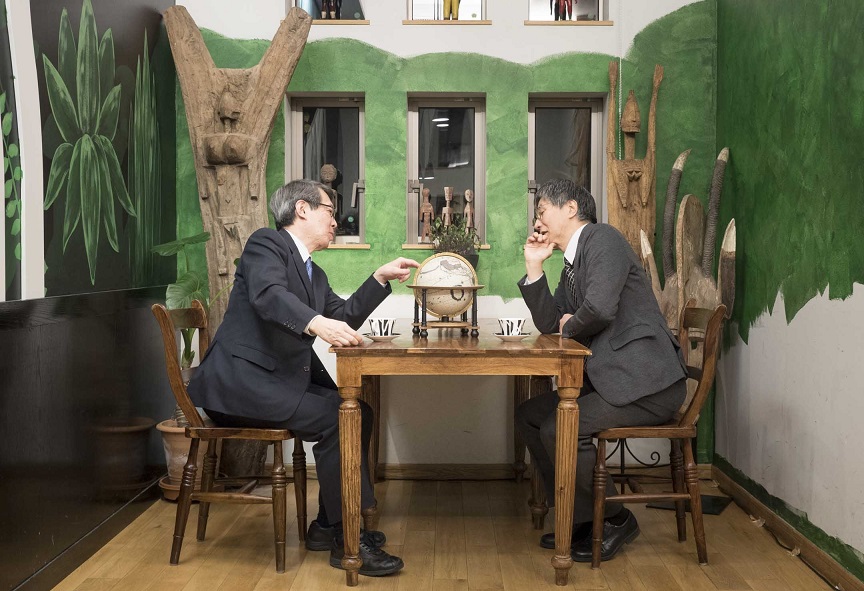
The place chosen as the venue for the discussion was the restaurant Abreuvoir (French for “watering trough”), which is located within the Mukougaoka Faculty House on the Yayoi Campus. The faculty house includes a restaurant with an artistic atmosphere, a wood-paneled bar, an accommodation facility comprising 14 rooms, and a conference room. http://www.abreuvoir.co.jp
~Extras~
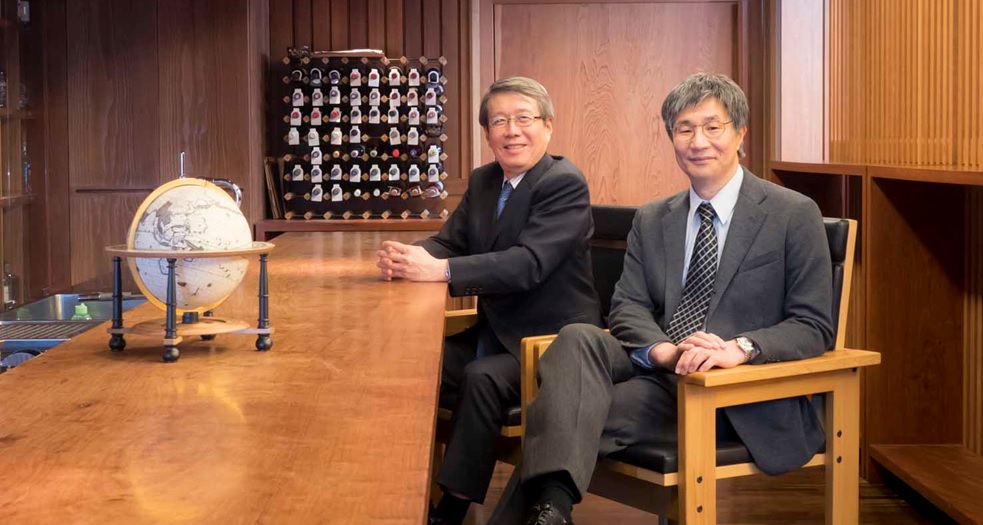
Extra Talk 1
Haneda: I do not believe there have been any cases as of yet in which Japanese knowledge has had a profound impact on the world’s knowledge structure, but now I am trying to make this happen by proposing a new method of depicting global history: looking at the world and its history from a viewpoint that is uniquely Japanese and differs from those in the West. This is by no means an easy undertaking, however.
Kariya: During the period from the 1980s to the 1990s, the merits of Japanese management systems attracted a lot of attention from people outside the country. The impact of the systems was really quite evident and, even now, Toyota’s production system is in common use across the world. As one of the strengths of Japanese management systems lies in their educational programs, their success brought attention to Japanese education. I am now conducting research into how Japan caught up with other countries to become a modern nation, and the educational policies taken by the country in the process are, to me, a veritable “gold mine” of knowledge. A variety of ideologies were incorporated into the measures, a fact which is not well recognized by neither researchers in Japan nor those outside the country.
Haneda: The true meaning of the Japanese term “kindai” will not be conveyed if it is translated as “modernity,” and this is a difficult issue regarding translation.
Extra Talk 2
Haneda: I think a truly international university is a university that has no executive in charge of international affairs and no “international division”-type departments. The University of Oxford does not have a “Division of International Affairs,” right?
Kariya: That’s right. It doesn’t have any divisions that are in charge of advancing internationalization in the Japanese sense.
Haneda: As long as an organization divides people into Japanese and non-Japanese, it will not be international. Nevertheless, Japanese universities usually have administrative departments established based on this kind of division.
Kariya: While other old universities in Europe are rated low in the THE rankings, the University of Cambridge and the University of Oxford are ranked high on international measures because they are universities located in the English-speaking world. Meanwhile, universities in the United States have many international students, but tend to be oriented toward their own country or own interests.
Haneda: In the United States, internationalization would never mean to use languages other than English. The Japanese concept of “kokusaiteki” is different from “international” in this regard.
Extra Talk 3
Kariya: I had my first overseas experience when I visited California for a summer language program before studying at Northwestern University. I fully enjoyed the experience.
Haneda: Ah, yes. Northwestern. That university is in Chicago.
Kariya: I was to take a doctoral course at the university, but had a lot of difficulty with English. It is said that Japanese people can read and write English but cannot speak it, but I was unable to read or write English, not to mention speak it!
Haneda: I had my first overseas experience in the former Soviet Union, and I happened to study in Paris, due to the impact of the Iranian Revolution. I arrived in the city in winter and found that there was no heater in the room I was staying in. I went to a shop to buy a heating appliance and found one I wanted, but they wouldn’t sell it to me even after asking many times. Later, I found out that it was because I was asked whether I would pay by cash or by check, but I couldn’t understand what they meant because it was the first time for me to hear the word “cheque” (laughs).
Kariya: That’s because in Japanese schools, you don’t learn what people actually say in their local languages in daily life.
Haneda: Winter in Europe is really cold.
Kariya: It’s cold in Chicago, too! (laughs)

The oldest existing globe among those that were imported to Japan during the Edo period is held in the collection of the Matsura Historical Museum in Nagasaki Prefecture. The globe was made by Gerard Valk (also spelled “Valck”), a famous copperplate engraver, in the Netherlands in 1700 and subsequently made its way into the hands of Matsura Seizan, daimyo lord of the Hirado Domain. Because the globe was created in the days before Ino Tadataka and Thomas Cook made their contributions, Japan is shown sans Hokkaido while the areas around Australia are marked incorrectly. A beautiful piece of craftsmanship, the globe gives us a hint of the atmosphere during the Age of Discovery.
Watanabe Co., Ltd. blue-terra.jp
About the Participants
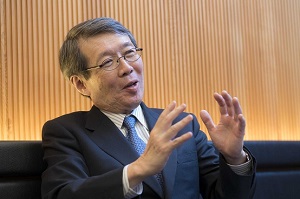
Masashi Haneda
Born in 1953. After serving as a professor and then Director of the Institute for Advanced Studies on Asia at the University of Tokyo, he became a Vice President of the University and Director General of the University’s Division of International Affairs. He has been Executive Vice President in charge of international affairs at the University since 2016. He specializes in world history and his major writings include Atarashii Sekaishi e (The Shift to a New World History; Iwanami Shoten), Asian Port Cities, 1600-1800 (NUS Press and Kyoto University Press, 2009), Higashi Indo Gaisha to Ajia no Umi (The East India Company and the Oceans of Asia; Kodansha), and Islam Sekai no Souzou (The Creation of Islamic Society; University of Tokyo Press). He enjoys playing tennis and watching kabuki performances.
Born in 1953. After serving as a professor and then Director of the Institute for Advanced Studies on Asia at the University of Tokyo, he became a Vice President of the University and Director General of the University’s Division of International Affairs. He has been Executive Vice President in charge of international affairs at the University since 2016. He specializes in world history and his major writings include Atarashii Sekaishi e (The Shift to a New World History; Iwanami Shoten), Asian Port Cities, 1600-1800 (NUS Press and Kyoto University Press, 2009), Higashi Indo Gaisha to Ajia no Umi (The East India Company and the Oceans of Asia; Kodansha), and Islam Sekai no Souzou (The Creation of Islamic Society; University of Tokyo Press). He enjoys playing tennis and watching kabuki performances.
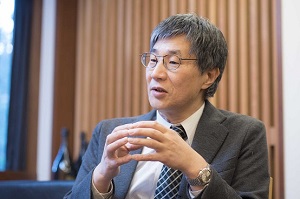
Takehiko Kariya
Born in 1955. Worked as an assistant professor at the National Institute of Multimedia Education and as a professor at the Graduate School of Education, the University of Tokyo. He has been serving as a professor at the Nissan Institute of Japanese Studies and the Department of Sociology at the University of Oxford since 2008. He specializes in sociology, specifically in the sociology of Japanese society. His major writings include Igirisu no Daigaku/Nippon no Daigaku (British Universities and Japanese Universities; Chuko Shinsho La Clef), Kyouiku to Byoudou (Education and Equality; Chuko Shinsho), Kyouiku no Seiki (The Century of Education; Chikuma Gakugei Bunko), and Gakuryoku to Kaiso (Learning Ability and Hierarchies; Asahi Bunko) as well as Education Reform and Social Class in Japan (Routledge). He enjoys walking and swimming.
Born in 1955. Worked as an assistant professor at the National Institute of Multimedia Education and as a professor at the Graduate School of Education, the University of Tokyo. He has been serving as a professor at the Nissan Institute of Japanese Studies and the Department of Sociology at the University of Oxford since 2008. He specializes in sociology, specifically in the sociology of Japanese society. His major writings include Igirisu no Daigaku/Nippon no Daigaku (British Universities and Japanese Universities; Chuko Shinsho La Clef), Kyouiku to Byoudou (Education and Equality; Chuko Shinsho), Kyouiku no Seiki (The Century of Education; Chikuma Gakugei Bunko), and Gakuryoku to Kaiso (Learning Ability and Hierarchies; Asahi Bunko) as well as Education Reform and Social Class in Japan (Routledge). He enjoys walking and swimming.
Photos: Junichi Kaizuka
* This interview was originally printed in Tansei 34 (Japanese language only). All information in this article is as of March 2017.
* This interview was originally printed in Tansei 34 (Japanese language only). All information in this article is as of March 2017.






